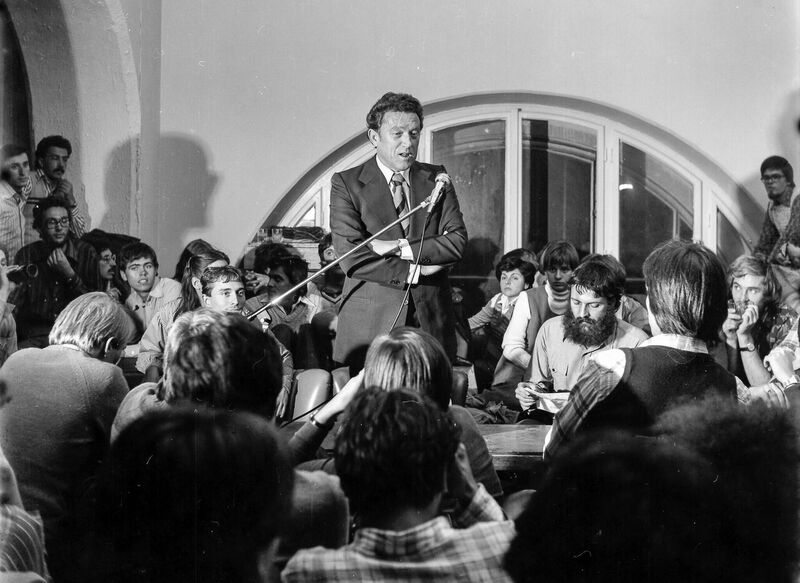Secret-service agents monitored the opinions of students and the political issues that emerged among them and within the opposition groups at the Karl Marx University of Economic Sciences (Marx Károly Közgazdaságtudományi Egyetem, or MKKE). The political police focused on club life at the university and the students who dealt actively with public life and political issues.
The student movements in Paris in 1968, the new left-wing trends and the alternative genres and forms in artistic life had an effect on the students at the university. In the 1960s, political issues appeared in their conversations. The political police observed and monitored the students’ discussions. Agents gained their information through talking with the students and visiting the different events and programs associated with the Közgáz-klub. The rhythm of university life influenced the reports: during exam periods, the students were more passive and there were fewer programs, but more talk in the corridor. Student life was more active during the semester.
By following the secret police’s directions, the agents focused on the following questions: how did the discussed subjects turn from university topics into political issues and what kind of ideological thoughts stood behind this?; how serious was the organizational work inside the university?; and was there any intention to create an association among universities?
Club life at MKKE was monitored by agents with the codenames Lantos and Csikós between 1973 and 1985. The active time period began in 1976, when a young teacher named Gyula Jobbágy became the leader of the Közgáz-klub. The most important events of this club were political debates known under the collective name Polvax. The organizers of these debates invited different specialists and political leaders to hold lectures after which the audience got an opportunity to ask them questions. In 1981, the political police also paid great attention to the Meeting of Students from Universities and Colleges in Budapest (Budapesti Egyetemisták és Főiskolások Találkozója, or BEFŐT).
Significant interest surrounded the Polvax debates. An increasing number of Budapest university students attended the lectures. According to Csikós, this became the fixed and steady program of the students. He wrote that some sensitive issues emerged, though initially debate was conducted in a way that was suitable to the régime due to the fact that the invited guests were official party or state leaders, which guaranteed politically acceptable interpretations. However, speakers were also chosen from the group of opposition political officials and intellectuals. The former included Imre Pozsgay and Rezső Nyers, while the latter included philosopher Ágnes Heller and poet Sándor Csoóri. The topics were very different: appraisal of the decade of the 1950s, the actions of the leaders of Romania, the ramifications of the Polish movements in 1981, the 25th anniversary of the 1956 Hungarian Revolution, etc. Lantos reported about the speeches and comments after having attended the meetings as a member of the audience.
In 1980, Lantos reported already about the negative effects that the Polvax debates posed in terms of the students’ thinking. He wrote that the debates were a very good opportunity to speak about social problems, but that these were discussed from a one-sided perspective and that they therefore produced more damage than benefit. Lantos remarked that the organizers manipulated how the topics were interpreted by the speakers and that this had a great impact on the audience, noting that the young students were very impressionable. He concluded that these discussions portrayed a false picture of society.
For the secret service, it was important to find the key people. The secret service considered the leaders Gyula Jobbágy and Tamás Kiss B. to be the radical opinion makers. The agents had to reveal how the trends were directed by the main actors who influenced opinions of the students. According to the agents, as a result of this, students who had earlier maintained a positive opinion of the communist party and the Hungarian Young Communist League also became critical. They had to determine the tendencies of the opposition groups. Lantos identified three such groups at MKKE: the nationalists; the anti-Marxists; and the pacifists.
In the Spring of 1981, the interest of both university students and the political police was focused on the Meeting of Students from Universities and Colleges in Budapest (Budapesti Egyetemisták és Főiskolások Találkozója, or BEFŐT). The Gyula Jobbágy–initiated aim of the BEFŐT discussions was to create a forum for the free expression of opinions with the participation of university students rather than Hungarian Young Communist League (Magyar Kommunista Ifjúsági Szövetség, or KISZ) members. Secret-service agents searched for the conflicts and fault lines that existed inside the university groups. Lantos discovered one source of dissent within BEFŐT. According to him, some activist did not want to establish a new organization—they believed that KISZ could be reformed.
Lantos concluded that the young men behind the BEFŐT organization believed that intellectuals should govern the state instead of workers and that knowledge therefore represented the greatest social force. Secret police officials regarded this idea to be dangerous because they thought it would result in unified actions among dissident university students. The secret police were afraid that these groups would become institutionalized. Finally, the political leadership of MKKE successfully prevented the above from happening through threats to members of the organization and control over discussion surrounding it.
Gyula Jobbágy was subsequently forced to emigrate. The Polvax debates took place again for a short time in 1983, but political leaders censored the debate programs and the invited speakers, thus their essence was lost. The secret-service agents perceived that the students had become disappointed in BEFŐT because they regarded the club to be closed and manipulated and believed that it had failed to represent their true problems and to examine topics in which they were interested.

